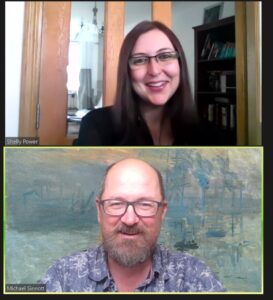Remote Working Stories: Shelly Power, Engineering and Architecture College Office
By Michael Sinnott, UCD Agile
In this instalment of Remote Working Stories, we meet Shelly Power, currently in the Engineering and Architecture College Office, two weeks after her August 4 launch of the new exceptional change of grade process. Shelly ran this ‘tight timelines’ project alongside Karen McHugh and John O’Connor from Assessment and Bronwyn O’Callaghan and Emma Hurley from EAG.
My main question, as I met up with Shelly on Zoom, was ‘What was it like to run a remote project?’ That turned out to be the wrong question. Like the year ahead of us, her story is not about perfect planning but how well we react to emerging circumstances.

The exceptional change of grade process, to put it simply, is the mechanism by which grades are changed after the Programme Boards close their grade approvals. Subsequent changes of grade go through an approvals process before the student’s record is updated, GPAs recalculated, and transcripts affected. This process is rooted in Academic Regulations, academic authority and formal responsibilities. Changes are subject to review and approval, involving module coordinators, Heads of Subject, Heads of School, programme chairs, administrators, Academic Council subcommittees, and more.
The anticipated consequences of the new Academic Regulations along with the unanticipated changes to assessment and grading arising from COVID-19 were together expected to significantly increase the number of post board grade changes. How would this work? Shelly noted that with all the pressures and changes, the existing highly manual process “could have resulted in students not being awarded their degrees on time, or not completing on time”. This would have a big impact on some students and put significant pressure on the Assessment team”. How to make sure this did not happen?
As a priority set by the Registrar and the Director of Assessment, Shelly and her colleagues in Assessment and EAG were given the IT resources they needed six weeks from the start of June to implement a new process, set to go live on July 20.
In 2019 Shelly made use of Green Belt training with UCD Agile to redesign this process, gathering requirements and needs from around the campus, analysing existing processes and data, and designing a workflow-based solution, consistent with Academic Regulations and making the process easier and faster. All this work was in the bag, heading into June 2020, as they began developments. Shelly: “These eight weeks were dedicated purely to the design, build, and testing of the workflow.” The team was Shelly, on loan to Assessment from the Engineering College Office, sponsorship from Karen McHugh, assessment operations from John O’Connor, IT project management from EAG’s Bronwyn O’Callaghan, with Emma Hurley creating the technical solution and attuning the build over the course of the project, in so far as technically possible.
The mechanics of this virtual and remote team were really quite simple – Google Sheets for shared information and tracking, Zoom for team meetings and ad hoc get togethers, with e-mail and Google Chat for the day to day contact. Were there particular down sides to doing the project remotely? “I think we would have had more face to face [if we were all] in Tierney, ad hoc meetings face to face, or me just calling up to Emma in her office. [Only being online] delayed things and it led to some ambiguity. There were a few times where something which seemed straightforward, just grew legs and layers and we had to get on camera and thrash it out together. So I did miss the physical presence of being in a meeting.”
As Shelly started the project, she had a strong analysis and clear plan, committed colleagues, and access to IT resources. Then came ‘emerging circumstances’.
Jeremy Britton and Amy McDonald run a weekly Remote Working Group which, as Shelly noted, brings together “a number of school managers, programme managers and administrative staff from various units around the university. And it’s proving quite popular and a great means of these various units communicating.”
Shelly started giving weekly updates to this group, and what emerged from these conversations did not fully match up, surprisingly, with similar conversations in the 2019 analysis phase. The original analysis was driving a process and system with a nice, ‘logical’ workflow from module coordinator to Head of School to Board Chair to Assessment administrator. What emerged from the Remote Working Group discussions was a more subtle understanding of the variety of who carries out the various roles, and how this ‘who’ can differ between Schools and Colleges. Taking this on board, the project was extended from six to eight weeks to allow this local configurability to be built in, as far as was feasible, whilst staying consistent with Academic Regulations.
Shelly summed up the value of the Remote Working Group by saying that “working with the stakeholders, and having honest and open conversations with them, made what the original EGC Project Team and I had designed in 2019 better.” Looking for and embracing what emerged made for better outcomes.
It is early days and I am sure the new process is only bedding down, but well done to all involved. Running a project in Zoom rather than in Tierney may have its minor challenges, but Shelly’s story is not about the mechanics of running a project but is more about the power of working together to a common end – making processes better for students and easier for staff.
Once again, it is inspiring to learn from our colleagues’ experiences of ‘getting the job done’ in meeting and beating the challenges we face. My thanks to Shelly for her time and for her story.
